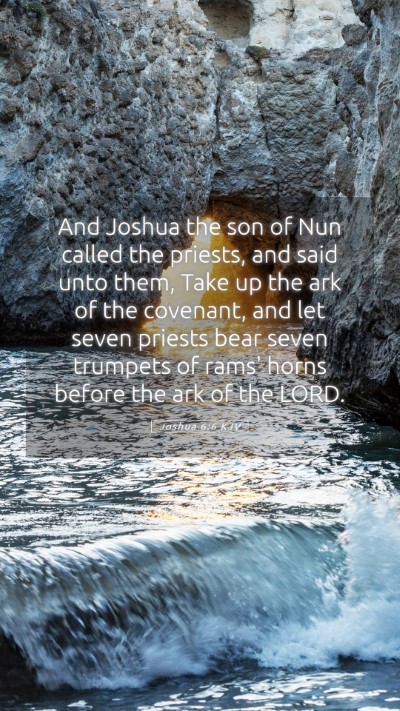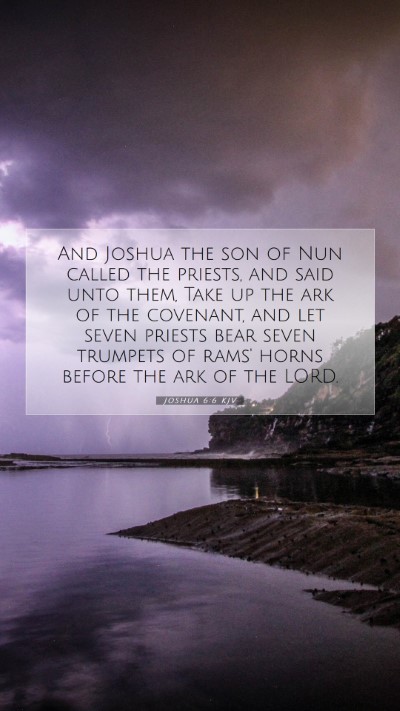Understanding Joshua 6:6
The verse Joshua 6:6 reads: "And Joshua the son of Nun called the priests, and said unto them, Take up the ark of the covenant, and let seven priests bear seven trumpets of rams' horns before the ark of the Lord." This verse is crucial in understanding the Israelites' conquest of Jericho, encapsulating significant theological themes and historical context.
Bible Verse Meanings
Joshua 6:6 serves as a pivotal moment in the narrative of Israel's entrance into the Promised Land. It underscores the importance of divine instructions and the proper guidance of leaders. The gathering of priests and the ark signifies the awareness of God's presence in their military campaign.
Leadership and Obedience
- Matthew Henry Commentary: Henry emphasizes that Joshua's leadership is characterized by obedience to God's commands. Joshua directly engages the priests, revealing his trust in God's strategy rather than conventional military tactics.
- Albert Barnes: Barnes notes that the call to the priests was an act of faith, whereby Joshua demonstrated reliance on God’s promises and the power of worship over warfare.
- Adam Clarke: Clarke highlights that the priests’ role symbolizes the intercession and representation between God and His people, showcasing how worship is integral to victory.
Bible Verse Interpretations
This verse can be interpreted in various theological dimensions:
- Divine Presence: The ark represents the covenant and the presence of God among His people, signifying that their victory comes from God.
- Faith in Action: The requirement for the priests to carry the trumpets emphasizes the importance of faith in action, reflecting the belief that victory is assured through divine intervention.
Symbolism of the Ark
The Ark of the Covenant, mentioned in this passage, serves as a potent symbol of God's covenantal promise. It signifies not merely a physical object but the living presence of God among His people, guiding them in their endeavors.
Scripture Analysis and Biblical Exegesis
The context of Joshua 6:6 is vital for understanding how God's plan unfolds through seemingly unconventional means. The call to action includes:
- Preparation for Battle: The priests’ act of bearing the ark and trumpets is part of a larger strategy that employs sound as a means of spiritual warfare.
- Importance of Worship: The use of trumpets is reminiscent of worship practices, indicating that acknowledgment of God’s sovereignty comes before physical action.
Application of Joshua 6:6 in Daily Life
For modern believers, this verse can be a source of encouragement to approach challenges through prayer and worship. Drawing on the themes from Joshua 6:6 encourages a faith-based approach to life, illustrating that trusting in God leads to meaningful victories.
Lessons for Bible Study Groups
When discussing Joshua 6:6 in Bible study groups, consider these themes:
- How does faith influence our approach to challenges?
- What role does worship play in our personal or communal battles?
- How can we learn from Joshua’s leadership in our own lives?
Additional Bible Cross References
This verse connects with several key biblical passages:
- Hebrews 11:30: "By faith the walls of Jericho fell down, after they were compassed about seven days."
- Exodus 25:22: "And there I will meet with thee, and I will commune with thee from above the mercy seat."
- 1 Chronicles 15:24: "And Shebaniah, and Jehozabad, and Nethaneel, and Amasiah, and Zechariah, and Benaiah, and Eliezer the priests, did blow with the trumpets before the ark of God."
Conclusion
In conclusion, Joshua 6:6 encapsulates themes of leadership, faith, and divine presence. For anyone looking for biblical exegesis, this verse illustrates how reliance on God in worship can lead to extraordinary outcomes. It encourages readers and study groups to understand that while battles may require physical strength, the essence of victory often lies in spiritual fidelity.


